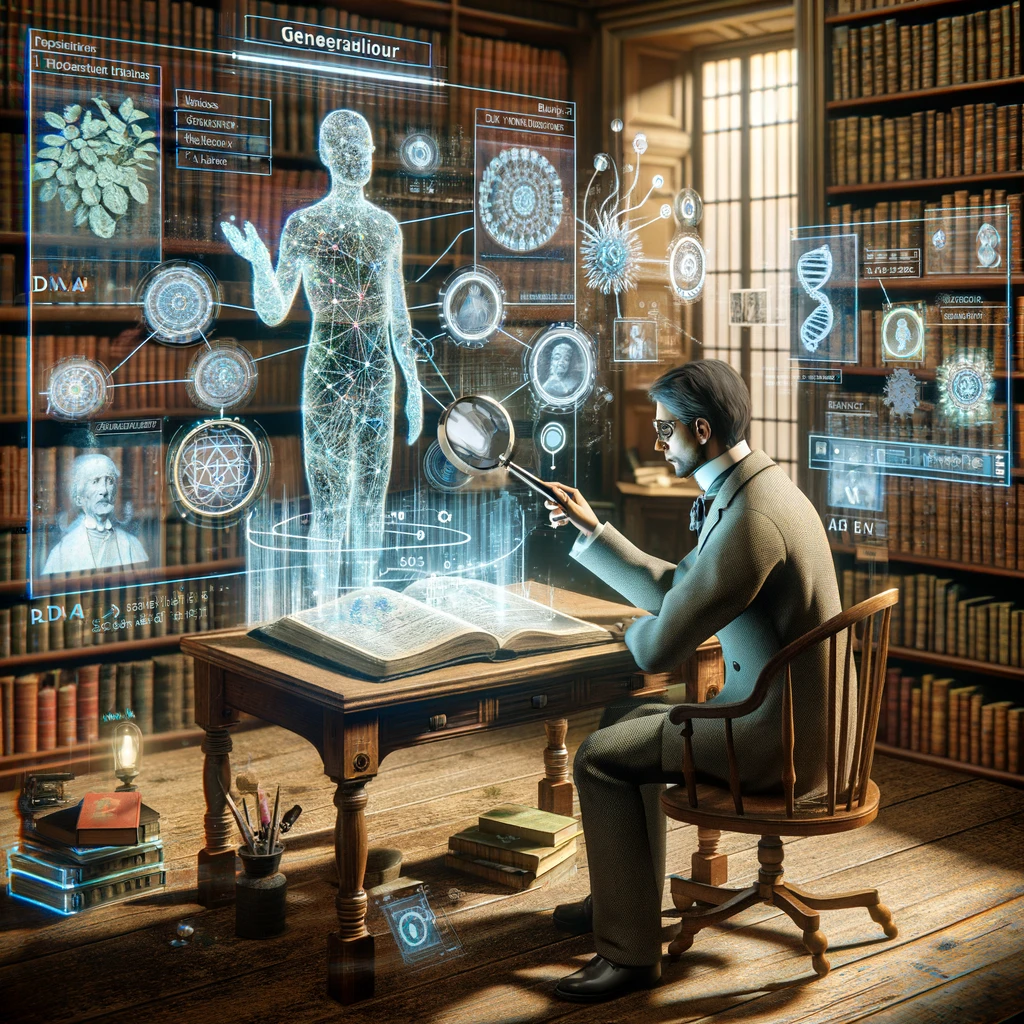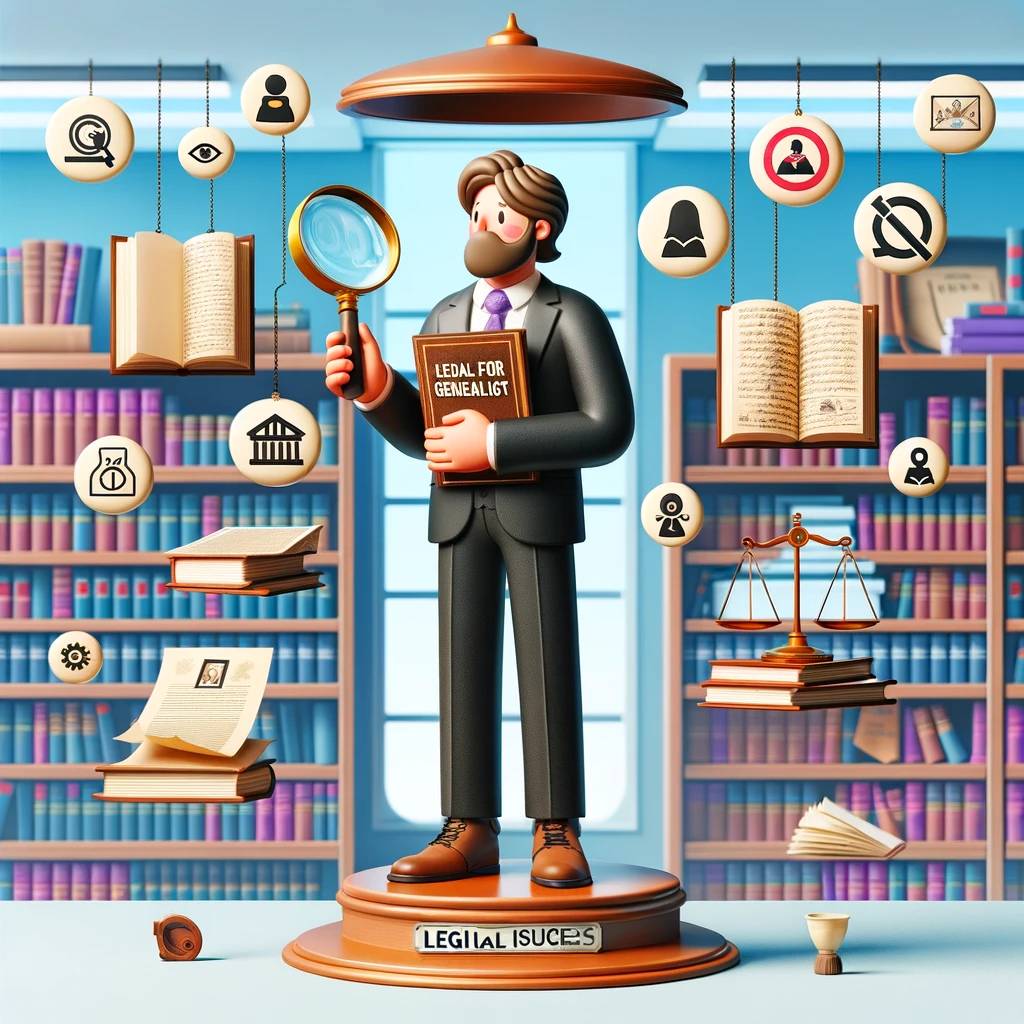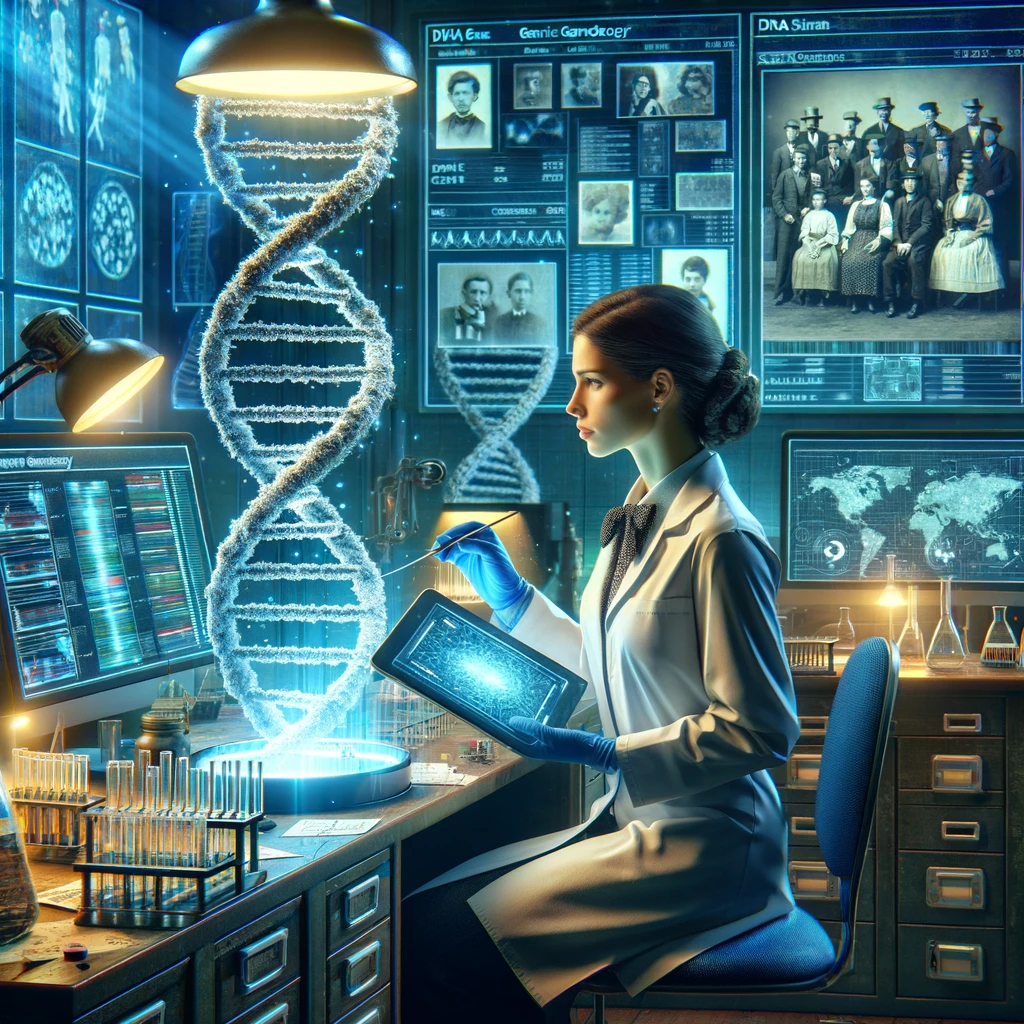Is your group interested in learning more about DNA testing and how it can be used in your genealogical research? Or are you curious about the intersection of genetics and history? I lecture all over the United States, Canada, and several other countries to groups of all sizes and experience levels, and I’d love to speak to your group. Below are some of the lectures I provide. Each lecture is a stand-alone talk, but they can be mixed-and-matched for a full-day workshop.
If you’re interested, click HERE to contact me!
NEW Lectures for 2025 (Virtual or In Person):
New for 2025! In addition to my other lectures below, I am developing the following NEW lectures for 2025 and beyond. If your organization is interested in these lectures, contact me today!
- Patents and Pedigrees: Discovering Genealogical Gems in Patent Records – Explore the often overlooked resource of patent records for genealogical research. This lecture will introduce the basics of what patent records are, such as inventor names, dates, and locations. Through the examination of the genealogical value of patent records, we’ll uncover how they can provide insights into our ancestor’s lives. The session will include practical guidance on accessing patent records through online databases and archives, supplemented by case studies that illustrate successful genealogical discoveries made using these records. Attendees will gain a comprehensive understanding of how to leverage patent records to enrich their family history research, unlocking new dimensions of their ancestors’ lives and legacies.
- Sprinters, Caffeine Addicts, and Daredevils! Understanding DNA-Based Traits – Delve into how genetic testing reveals insights into our traits and predispositions beyond ancestry. This lecture will explore how specific genetic markers can indicate tendencies like athletic ability, caffeine metabolism, and risk-taking behavior. We’ll discuss the science behind these traits, emphasizing how DNA influences them and the implications for understanding ourselves and our ancestors. Attendees will learn how to interpret trait reports from DNA tests and how to integrate this information into broader genealogical research, adding depth to family stories. By examining the connection between genetics and personal characteristics, we aim to enhance genealogical narratives with a richer understanding of inherited traits.
- DNA-Based Relationship Estimators and Analyzers – Explore the tools and methodologies used in genetic genealogy to estimate and analyze relationships between individuals based on DNA data. This lecture will cover how relationship estimators analyze shared DNA segments to predict familial connections. We will discuss the science behind these estimators, including centimorgan (cM) values and segment analysis, and how they are used to build and verify family trees. Attendees will learn to interpret DNA match results, utilize relationship prediction tools effectively, and address common challenges, such as outliers. By integrating these advanced DNA analysis techniques, genealogists can enhance their research, solve complex family mysteries, and validate traditional genealogical findings.
Artificial Intelligence (AI) and Genealogy:

Interested in learning more about the use of artificial intelligence (AI) and AI-based tools for genealogical research? These are a few well-received presentations that I’ve given over the past year. Unfortunately, most AI presentations are far too advanced for genealogists. As with the early days of genetic genealogy, the field needs easy-to-understand presentations about how genealogists can utilize artificial intelligence to facilitate their research. Here are a few:
- Using Artificial Intelligence Tools for Genealogy – Generative artificial intelligence (AI) is a valuable new tool for genealogists, potentially saving 100s of hours a year and offering new ways to organize our research. However, these tools have important limitations that must be understood in order to utilize them properly and efficiently. We will cover the benefits and limitations of generative AI, and how you can explore this entirely new field without becoming overwhelmed!
- 10 Generative AI Prompts Every Genealogist Needs to Know – The “prompt” is perhaps the most important aspect of generative artificial intelligence (AI). The prompt is how we direct AI tools to give us the output we desire. However, forming these prompts can be challenging and is rarely a one-shot attempt. We will identify how to formulate (and reformulate!) AI prompts and look at ten example prompts that can save us significant time and effort.
- Ethical Issues Associated with Generative Artificial Intelligence – Generative artificial intelligence (AI) is a valuable new tool for genealogists, potentially saving 100s of hours a year and offering new ways to organize our research. However, these tools also raise numerous potential ethical issues for genealogists. We will discuss many of these issues including plagiarism, copyright infringement, and more, so that you can avoid problems while exploiting AI tools for your benefit.
- Memories in the Digital Age: AI Transcription of Handwritten Diaries – My mother kept a diary off and on throughout her adult life. She recently passed, and I would like to preserve her diaries and be able to share the content with my siblings. Follow along as I digitize and transcribe her handwritten journals using artificial intelligence (AI).
Also explore my Artificial Intelligence page to learn more!
Ephemera/Artifacts and Genealogy:

In addition to AI and genetic genealogy, I specialize in rarer presentations that add depth to our ancestors’ lives and explores social history. Information mined from postcards, newspapers, and heirloom plants help to enrich our understanding of the past.
- Using Post Cards to Enhance Your Research – Postcards were ubiquitous in the past, with billions mailed during the “golden age” of the medium. Not only do postcards picture many of the cities, small towns, and villages where our ancestors may have lived, many contain messages and signatures from our ancestors. Learn how to find and utilize these valuable heirlooms to supplement your research.
- Heirloom Plants – One of the most common items passed down from generation to generation are plants, both indoor and outdoor. Together we can explore some of these plants and the stories associated with them. We will also learn how to preserve and share these heirloom plants to ensure their stories are told and saved for future generations.
- Using Newspapers to Fill Out Your Ancestors’ Lives – Archived newspapers hold vast amounts of information about our ancestors and relatives, serving as the main social media platform of the past. Identifying newspapers and exploring their content can add significant information and depth to the past.
Legal Issues for the Genealogist

As an intellectual property (IP) attorney, I have an in-depth understanding of some of the IP issues that genealogists might face on a daily basis.
- Copyrights and Trademarks for the Genealogist – As genealogists, intellectual property is one of our greatest assets. We write client reports, articles, blog posts, and so much more. Learn about how copyright and trademark law protects your intellectual property. And just as importantly, discover what you should do to avoid infringing on the rights of others!
- Ethical Issues Associated with Generative Artificial Intelligence – Generative artificial intelligence (AI) is a valuable new tool for genealogists, potentially saving 100s of hours a year and offering new ways to organize our research. However, these tools also raise numerous potential ethical issues for genealogists. We will discuss many of these issues including plagiarism, copyright infringement, and more, so that you can avoid problems while exploiting AI tools for your benefit.
Genetic Genealogy Presentations:

Evolving from a rarely-used and barely-understood new tool to a fundamental and often essential component of reasonably exhaustive genealogical research, genetic genealogy has changed the field of genealogy forever. Below are some of the presentations I offer for societies and conferences (organized roughly from more beginner to more advanced) to help ensure that this tool is efficiently and effectively utilized.
- Utilizing mtDNA and Y-DNA – Y-DNA and mtDNA testing and have helped genealogists break through thousands of stubborn brick walls. Learn about the unique inheritance of Y-DNA and mtDNA in your family, how these tests can be used to explore your ancient ancestry, and how the results can identify your relatives both close and distant.
- Understanding and Utilizing X-DNA – X-DNA has a very unique inheritance pattern that makes it a valuable aspect of genealogical research. Learn about this unique inheritance pattern, about the benefits and limitations of X-DNA, and how X-DNA can be used to explore your ancestry.
- Introduction to Autosomal DNA (atDNA) – Autosomal DNA is one of the most powerful tools available to genealogists. During this presentation we will study the inheritance of autosomal DNA, the benefits and limitations of atDNA, and how we can exploit atDNA for our research.
- Using Autosomal DNA for 18th and 19th Century Mysteries – Even though our 18th and 19th century ancestors have been dead for decades, their DNA still survives in their descendants. Learn how to use autosomal DNA to attack and potentially solve genealogical mysteries and brick walls for ancestors who were born or lived in the 1800’s, 1700’s, and beyond
- Understanding the DNA Testing Company Websites and Tools – Together we will explore the genetic genealogy company offerings, including the tools and analyses offered by the testing companies themselves. This will help us determine which tests and tools are best for our particular research question.
- Are You Doing Everything? – In this lecture, we will examine numerous ways you can use a match’s profile to identify who they might be and thus how they might be related to you!
- Third-Party Genetic Genealogy Tools – In this session I will introduce students to some of the most important and useful third-party tools available to genealogists using DNA evidence.
- Introduction to Ethnicity Analysis – We will examine the various methods by which ethnicity estimates are generated by the testing companies. We will explore the limitations and benefits of ethnicity estimates, including how we can use them for our genealogical research.
- Chromosome Mapping and DNA Painter – Chromosome mapping – assigning segments of our DNA to our ancestors – is an important aspect of DNA evidence. In this session we’ll review the concepts behind chromosome mapping and introduce you to DNA Painter, an essential third-party tool for mapping. [Also see the Advanced Chromosome Mapping lecture below].
- Privacy and Ethics – Surprise results are increasingly common as more people test their DNA. This session includes discussions on cultural attitudes to DNA testing, privacy, and ethical issues every genealogist should consider before sharing genetic information or asking relatives to test their DNA.
- The Danger of Distant Matches – Distant genetic matches are exciting, but they can be dangerous! Evidence shows that distant matches sharing a small amount of DNA are often false positives and fail to match either of our parents. Together will examine the problems that can arise when reviewing distant genetic matches at your testing company.
- The Helen Marley Story – A case study identifying the mother of my adopted great-grandmother, born Helen Marley Johnson. Although no single record identifies her mother, indirect evidence and DNA testing makes the case.
- Investigative Genetic Genealogy: A Neutral Review – In this session, we will examine some cultural attitudes to DNA testing, privacy, and ethical issues, including the use of genetic genealogy databases for law enforcement investigations.
- Formulating a DNA Testing Plan – DNA testing can be expensive, but DNA evidence is a component of exhaustive research when it is available. Identify some of the ways you can minimize costs while maximizing results by formulating a DNA testing plan early in your research.
- Understanding Native American DNA – Does your family narrative contain a story of Native American ancestry? What should you expect when you review your ethnicity estimates? Together we will examine concepts such as recombination and segment loss, the limitations behind ethnicity estimates, and more as we examine this difficult topic.
- Genetic Genealogy Year in Review – New tools, techniques, and tricks for genetic genealogists are always being created and developed. This lecture examines the very latest developments in the field and helps you understand how these new tools can be incorporated into your research.
- The Future of Genetic Genealogy – Genetic genealogy is a powerful new tool for genealogists, and yet this tool is only ~25 years old. What will genealogy look like in 5 years? In 20 years? Based on recent trends, as well as the needs and wants of genealogists, what educated guesses can we make about the future of genealogy?
- Advanced Y-DNA Evidence (Including Big Y-700) – Y-DNA evidence is incredibly powerful when used properly. Students will learn targeted testing techniques, how to interpret Y-DNA results, using (and reasons for using!) the Big Y700 test, and more. After this class, students will have a solid foundation for using Y-DNA evidence in their genealogical research.
- The Science of Autosomal DNA – Part 1 – Let’s explore some advanced topics in genetics, including recombination, ROHs, FIRs, HIRs, IBD/IBS/IBC, and more, and how these topics affect the results we see. Understanding these advanced topics help students further understand their autosomal DNA test results and gives students a framework with which to evaluate new tools, results, and concepts in autosomal DNA.
- The Science of Autosomal DNA – Part 2 – Together we will examine some advanced topics in genetics, including imputation, age of segments, so-called “sticky segments,” number of inherited segments vs. relationship, “pile-up” regions, and more. We will also examine the science behind AncestryDNA’s Genetic Communities (and groups at 23andMe and MyHeritage) and how they differ from traditional ethnicity analyses.
- The Science of Autosomal DNA – Part 3 (Including Triangulation vs. Shared Matching) – We will examine advanced topics in genetic genealogy, including using shared cM to explore relationships, a brief introduction to WATO (covered in a full lecture later in the course!), obtaining DNA from artifacts (including rootless hair), and more! We will also examine concepts of segment triangulation and how it differs from shared matching, including how segment data might be overrated.
- AncestryDNA’s TIMBER and ThruLines, and SideView – The TIMBER, ThruLines, and SideView tools at AncestryDNA are widely misunderstood. In this lecture, we will examine these tools and how they can be utilized to expand our research.
- Building Research Trees, Using LucidChart, And Finding Living People – Building research trees is an essential component of successful genetic genealogy, and we will examine some tips and techniques. We will also examine the tree charting tool LucidChart and learn about techniques for finding living people and the most recent generation(s).
- Evaluating a Genealogical Conclusion Including DNA Evidence – Incorporating DNA evidence with documentary evidence is not a simple matter. It requires careful and methodical analysis of a variety of different autosomal DNA limitations and pitfalls, many of which we will discuss in this session. For example, we will examine essential considerations for EVERY genealogical conclusion using DNA, including confirmation bias, Tree Completeness, shared DNA amounts, and more.
- Advanced Chromosome Mapping Techniques – In this session, we’ll examine some advanced chromosome mapping techniques to help you assign more segments of DNA to your growing chromosome map! We will also examine how to incorporate ethnicity estimates from 23andMe and FTDNA into your chromosome map. [Also see the Beginning Chromosome Mapping lecture above].
- What Are the Odds (WATO) – Students will learn about WATO, a free tool hosted at DNAPainter.com and utilized to test hypothetical relationships using DNA-based probabilities. The tool is extremely useful for examining recent genealogical questions.
- Introduction to Visual Phasing – Visual Phasing is one of the most advanced methodologies in the field of DNA evidence. In this session, we will introduce the concepts behind visual phasing and review a few examples of the methodology. Although you won’t be an expert in visual phasing by the end, you’ll have a basic understanding of the process and be able to explore visual phasing on your own!
Hi Blaine,
I am interested in finding out if you are available to be a speaker for an all-day conference in Orlando, Florida in the spring of 2018. Can you please send me info on your availability and fees?
Thanks so much.
Elaine Powell
President, Central Florida Genealogical Society
Hi Blaine,
I spoke to you about being a speaker at our next Clan McAlister of America Gathering August 10-12, 2018 in Memphis, TN. I am writing to obtain confirmation that you are available that weekend and will be able to speak.
Also, you mentioned that you would be available to do one-on-one consultations while at the gathering. From your website, it seems consultations are $25.00/15 minutes and I would like to know if that is the appropriate fee as I would like to let folks know ahead of time so they can plan for a consultation.
Thanks so much,
Nancy Hudson
Treasurer, Clan McAlister of America
Administrator, FTDNA McAlister Project
I am interested in your programs for the 2019 Kansas Council Of Genealogical Societies Annual Conference. Would you contact me at KCGS, P O Box 3858, Topeka, Ks 66604-6858.
Thank you Ruth! I’ve sent you my contact information. I hope we can make the 2019 Kansas Council Of Genealogical Societies Annual Conference happen!
Loved your presentation in Ottawa last summer. Bought your book… “Family Guide to Genetic…”, it is so well written and as much as the material is complexe, you make reading it fairly easy and understandable! Merci beaucoup! Will be looking for more books and texts for adoptees and how to find clear paths to unknown parents.
Merci
Denis H. Dutrisac
Thank you for the very kind words, Denis!
Hi, Denis-
We are DNA cousins! I’ve analyzed your tree many a times, trying to figure it out. I’ve got a mysterious Joseph Lavoie in my tree. I help adoptees. Heard GWorks is good for fishing for surname of unknown parents or grandparents via algorithms and the geeky way, I’m a bit old fashioned and go about it with just my eyes, but solved all the cases I’ve worked on thus far that involved DNA and many with just traditional research. DNA helped me solve Joseph’s wife and learn her ancestry, but darn Joseph is elusive!,
Guess I need to get my eyes checked again as I accidently hit or put commas where other punctuation was needed. ; )
Look forward to hearing from you via FamilyTreeDNA. Oh and her name and line was Guyon, Marguerite Guyin. I’ve analyzed so many trees from matches with Lavoie that my brain is buzzed. To be fair to myself, I have had a TBI and it doesn’t take much to overload it. Maybe a new set of eyes from your end can see things I’ve missed. My tree is on Ancestry under Keniston Family Tree, hoping you can access it as its public.
Sincerely, Pam
Blaine,
I am the program director for the Augusta Genealogical Society and am interested in your programs. Could you please send me your contact info and typical costs for a full day program?
Julie Lenox-Sharifi
Blain
I have watched your Y-DNA webinar at Legacyfamilytree a number of times and I am still confused on the genetic distance & now I had my son tested and his results are so different from mine I am really confused.
Do you answer questions like this or do I need to hire you? If so what are you charges? I really need to get this resolved.
Thank you for your webinars and your book, Guide to Genetic Testing. My daughter took my copy when she went home. I will replace it.
Bob Jones
[email protected]
I have been working with Y-DNA study for several years, so understand it. My problem is autosomal discovery that father who raised my ex-husband was not his biological father. My sons Y-DNA (Sorenson) did not match the ‘raised father’s brother Y-DNA’ (ex-husband’s parents both deceased and have not told ex-husband what I found… nor have I told my daughter. My son’s autosomal DNA matched 167cm to a man who lived in the area. I feel confident that the biological connection is on his mother’s side … but I am at a loss here … as I don’t know how to read chromosomes to know WHERE the connection is. Is there a way to know exactly which line in the pedigree chart the chromosomes refer to. The guy’s mother had 3 uncles, who all had sons … so I am stuck. If you can send me information on costs to get help. Also, my local genealogy club has about 15 people who have spun off DNA group … they are all autosomal … so if you are in the area … ??
Blaine West Valley Genealogical Society of Youngtown Az would like to invite you to be our seminar speaker on 20 Feb 2021. Please send a contract at your earliest opportunity. I believe Kim Harrison spoke with you about ths recently at OGS or NGS.
I missed your presentation in Columbia, SC. When will you have another DNA workshop in the the Southeast. in 2019-2010.
dating in your 20s http://dating-sites-for-11-13.dating-site.nanoceramicshop.site online dating username ideas
the dating coach full movie http://how-to-cancel-zoosk-dating-site.dating-site.sumizawa-hobby.site beauty dating net
prwlueyrz
http://ezproxy.bucknell.edu/login?url=http://Glass-Heads.Tumblr.com/post/189560842937/check-out-this-sexy-toro-rig-toro-double-mac
Per your presentation to the New York Genealogical and Biographical Society (NYG&B); please what are the Links for both Med Better DNA and DNA Painter? Do your recommend other Free 3rd Party Tools? Thx
https://alternativeto.net/user/dywankowo19/
Where can I find a link to purchase your course Blaine Bettinger, PhD, JD, “Visual Phasing: Mapping DNA to Your Grandparents”
$69.99? Every link I have tried leads to a dead end.
Thanks
I am interested in some of the courses you listed but see no link to them. Is there another page we are not seeing?
Hi Blaine,
Our group is interested in several of your presentations via Zoom. Is this a possibility? Please contact me at your earliest convenience.